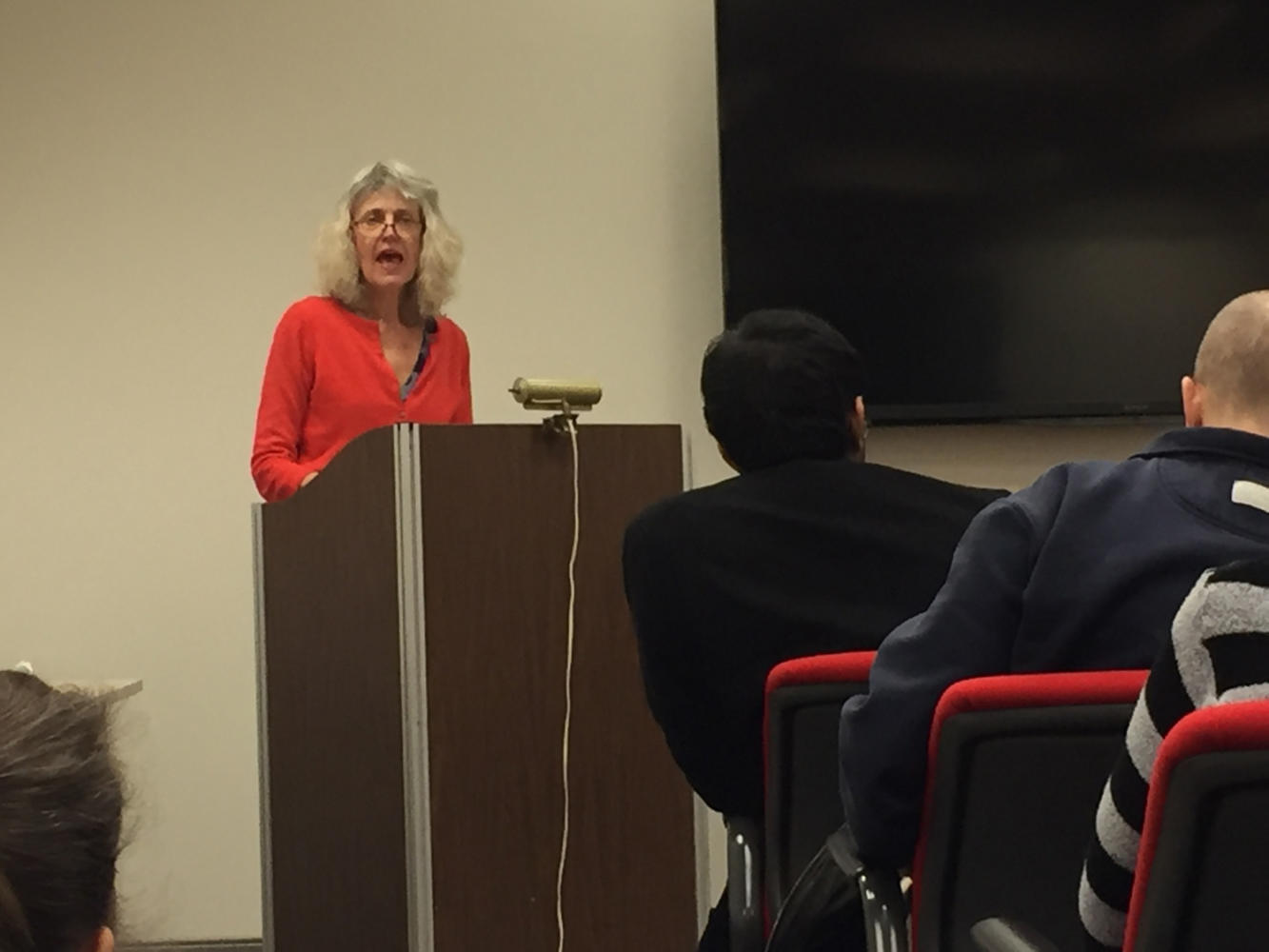Speaker gives lively talk on death


Anne Allison, professor of cultural anthropology at Duke University, discusses her research on the sociality of death in Japan at Friday’s “Matter of Death” event. (Photo by Noah Manalo | Staff Writer)
Anne Allison writes extensively on topics related to modern Japanese culture, ranging from sexuality to censorship. Her most recent publication on the precariousness of Japanese society has led her to explore a more morbid topic.
“I will try to make this lively, even though we’re talking about death,” Allison said before her lecture Friday.
Allison, a professor of cultural anthropology at Duke University, presented her research on the sociality of death in Japan in a lecture titled “Matter of Death.” About 40 students attended the Asian Studies Center-hosted event in the Anthropology Lounge of Posvar Hall.
Gabriella Lukacs, a professor in the department of anthropology, invited Allison through the Asian Studies Center. She said she finds Allison’s work fascinating and enjoys how her research connects different topics such as philosophy, psychology and feminism.
“I teach a course in Japanese society here at Pitt,” Lukacs said. “Any of her books could be used [for] their own courses.”
Allison compiled her research during three summers of field work in Japan where she attended events and conducted interviews. At the lecture, she described how a steadily decreasing population after World War II led to large amounts of elderly Japanese alone during their final years.
“Following wartime Japan, there was a push in society to downsize the household,” Allison said. “Now, marriage and childbirth are in the decline in Japan, employment is increasingly short-term and precarious and more and more people are living longer and alone.”
According to a 2014 report by Japan’s Ministry of Internal Affairs, approximately 61 percent of Japan’s population is over 65. Combined with the shrinking population, many Japanese are facing what’s known as a “lonely death,” when someone dies living on their own.
As a result, Allison said sociality — the tendency to group together in communities — has shifted in Japan to become more focused on the individual. The Japanese are placing more attention on a free and independent self as opposed to work and family, particularly in being able to handle one’s own affairs.
“There is now an active form of doing care by and for the self,” Allison said.
Part of this shift, Allison said, is that many Japanese handling their end-of-life arrangements — some to avoid being a burden on their family and others because they don’t have someone to care for them.
She explained how elder Japanese are now looking to “declutter” their lives, paying attention to methods such as the KonMari method.
“A new trend in minimal or simple lifestyle has developed in Japan,” Allison said, “involving a meditative process of evaluating on each item own, and either keeping and caring or throwing away.”
Created by Marie Kondo, this method of organizing consists of gathering together all of one’s belongings and keeping only those things that “spark joy” and throwing or giving away what is deemed unessential.
Allison examined new businesses emerging in Japan that help clients sort through the possessions left behind. Special cleanup of the “lonely dead” is one of the growing services. After a neighbor notices a dead body, a cleanup crew will clean the room, dispose of the body and kill any insects that had flocked to the dwelling.
She used the term “Ending Centers” to describe these facilities that handle the aspects normally taken care of by family members, such as planning funerals, organizing finances and taking care of human remains.
While many would expect these centers to be gloomy, “the atmosphere tends to be animated or bright,” Allison said.
She said there is a sense of joy and anticipation toward death, even being excited to be next to your “grave buddies.”
Raja Adal, a Pitt history professor and historian of Japan, was excited for the opportunity to hear Allison speak, as she is well respected in the field and familiar with the human experience.
“The ideas and issues are not foreign to us, but we are thinking about her research and this new form of sociality in a deeper fashion,” Adal said.
Hailey Roh, a sophomore studying political science, entered the lecture knowing almost nothing about the topic. She said she was fascinated by the sociality of death in Japan and learned a lot about the services provided for the citizens of Japan.
“It is interesting that Japan’s market is advocating for people to die alone rather than be more social,” Roh said.
Allison plans to write and publish a book about her findings about this new sociality, the creativity around death and what inspires its citizens. When an audience member asked her what constitutes a “good” death in Japan, she responded that she thinks Japanese people view dying alone as a “bad” death, with one of the worrisome parts of it being unable to get your affairs in order.
“People do want you to have a good time now,” she said. “Handle that, and have a good time now.”
Recent Posts
Therese Pitman: Giving back to Pitt’s student-athletes with equality
Pitman is Pitt’s Director of Student Athlete Development where she helps student-athletes navigate their career…
Pitt speech and debate team heads to nationals
The William Pitt Debating Union, Pitt’s speech and debate team, sends students to both in-person…
Visuals: A Year in Review
The visuals desk had an interesting year. In the midst of the 2024 Presidential Election,…
De-stress events across campus offer students a break from studying
During finals week, departments across campus are offering wellness events to help students manage stress…
Pitt students share their summer plans
After a long and strenuous academic year, many students are excited to take a break.…
Column | Collaboration and connection make us better — yes, even in journalism
Today is the last day I will ever do this, and despite the amount of…

